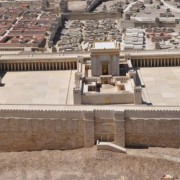During the forty centuries of its existence, the Jewish nation has been repeatedly exposed to complete annihilation. The history of Israel is a living “message” of GOD to the nations to “behold the goodness and severity of God.”
Many Gentile Christians say “How can I witness to Jewish people, I am not Jewish?” However, more Jewish people have been brought into the kingdom, receiving Jesus as their Messiah, through Gentile believers than through Jewish believers. So many people respond, “I don’t know the Old Testament well enough to witness to Jewish people.” It might amaze you to know that Jews know very little about the Old Testament. The average believer knows more about the Old Testament than 99% of the Jewish people you meet. Most Jewish young people, and even older Jewish people, I have spoken with have never heard of Isaiah 7:14 (the virgin birth of Jesus predicted), Isaiah 9:6 or Isaiah 53 (which predict Jesus’ death), or, as a matter of fact, any Old Testament prophecy predicting Jesus as the Messiah. Many are not even aware that Isaiah is even in the Old Testament.
In addition to this lack of knowledge of the prophetic scriptures, the gentile persecution against the Jews in the name of Christianity have formed a further veil over their eyes. They do not get a true picture of who Jesus is. They have heard tales from their fathers, grandfathers, great-grandfathers, who have passed them on from generation to generation. The words “CHRISTIAN – CHRIST & CROSS” can cause very negative reactions to most Jewish people. These words to the Jewish mind often are personally connected to family histories and bring up images of PERSECTION, INTOLERANCE, HATRED, TORTURE, and MASS KILLING. Why is this the case? Because of a real Gentile persecution against them in the name of Christianity. Consider the following, so you understand the Jewish view of Christianity. A short history tour:
Saint John Chrysotrom (344-407 AD), often referred to as the bishop with the golden tongue, stated “The Jews are the odious assassins of Christ, and for killing God, there is no expiation possible, no indulgence or pardon. Christians may never cease vengeance, and the Jews must live in servitude forever. God has always hated the Jews, and whoever has intercourse with the Jews will be rejected on Judgment day. It is incumbent upon all Christians to hate Jews.”
Saint Zeno (380 AD), Bishop of Verona, Italy, bewailed the fact that when inspired monks invaded Jewish homes to save Holy Scripture and in this process killed resisting Jews, only the bones of the dead ones were burned to ashes while there were still many Jews living who could have been burned for the glory of the Lord.
Saint Augustine (354 – 430 AD) said that the Jews called upon themselves for all eternity the divine malediction and must serve in no other capacity than as slaves.
Saint Athanasius (296 -373 AD), the Bishop of Alexandria, insisted that Rome deal with the Jews by use of the sword, tolerance was no better than treason against Christ.
Martin Luther (1483 – 1586 AD), once favorable toward the Jewish people, later said, “set the Synagogues on fire… in order that God can see that we are Christians… their homes should likewise be broken down and destroyed.”
In 1096, the first of four crusades was instigated by the established Church of Rome. Thousands of Jewish people were drowned, butchered and killed under the banner of the cross.
In 1099, the first crusaders finally reached Jerusalem, they assembled all the Jews in the great Synagogue and burned them alive while marching around the burning structure singing, “O Christ We Adore Thee.” (From the book, “The Jew and the Cross” page 59).
In the year 1262, in London, 1500 Jewish people were killed by enraged mobs led by cross-bearing clergy. From 1290-1659 AD, no Jew was allowed to live in England.
In 1550, Pope Paul IV said Jews must be servants, wear yellow badges, and be restricted to their ghetto without permission to speak to a Christian.
In the 15th Century, the Spanish Inquisition swept across Spain. It was designed to do away with any Jewish religious allegiance on the part of the Spanish Jewish converts to Catholicism (these converts were called “Marranos”). Fifty thousand Jewish people died in a three-month period under the sign of the cross.
In 1654, Peter Stuvyscent requested permission to expel the Jews from New Amsterdam (New York), saying the Jewish people are “the deceitful race – such hateful enemies and blasphemers of Christ – they should not be allowed to further infect and trouble this new colony.”
In 1881, the Pogroms (a Russian word meaning “devastation”) began to be carried out in Russia and Poland. A head clergyman devised a plan to destroy the Jewish people. One-third would be starved to death, one-third would be forced to emigrate and one-third would be converted by force if necessary. The Russian Orthodox priests would come out in the village squares during these pogroms and “bless” the Russian Cossacks and peasants who would carry out these pogroms “In the name of the blessed Jesus and the holy Madonna.” They would then proceed to murder hundreds of Jewish people by torture, fire and sword.
Note the above quotes on Jewish persecutions were taken from the book “The Jew and the Cross”.
All of these persecutions continued into the 19th century, and we are all familiar with our recent history. All of these named in this article attempted to annihilate Jewish people in the name of Christianity. It is no wonder one Jewish writer wrote, “To some, the Roman cross is a symbol of charity, and supreme devotion. To the Jew, it is a reminder of perennial persecution. The cross to the Jew is a symbol of pogrom (devastation).”
Jewish people need to know the difference between a Gentile who is not a believer and a Christian. We must tell them the difference. As one person has said “to them Hitler, the Pope, Mary Baker Eddy, Billy Graham are all Christians.”
A well-known Jewish Christian professor said that his former understanding was that all Gentiles were Christians; this kept him from accepting Jesus for a long time. He would see a drunk stumble out of a bar and often think, “if that is Christianity, I don’t want it.” I am so convinced, and often say while explaining the difference between Gentile and Christian, that to be a Christian, one must have a SPIRITUAL BIRTH FROM THE GOD OF ABRAHAM, ISAAC AND JACOB. That’s what the founder of Christianity, Jesus, said (John 3:3). To show Jews the difference between Christians and Gentiles, we must show them that we believe in the God of Abraham, Isaac and Jacob.
So what response can you give a Jewish person to whom the above persecutions are a stumbling block? The Word is the ultimate response, as it truly is a light for our feet and creates a very delicate path.
In Matthew 7:22-23, Jesus said that many would claim His name, and therefore claim to be Christians, who weren’t. They would even say they had done many wonderful works in His name… and yet had never known Him. Likewise, Jeremiah in the Old Testament (Jeremiah 23:14, 15, 25, 34, 39), states that false Jewish prophets from Jerusalem would come in the name of the God of Israel and presume to speak in His name, yet they would be speaking lies. It is interesting that in Jeremiah 23:39 and in Matthew 23:7, a similar fate awaits both false teachers and/or prophets “being cast away from His presence”.
Because of these persecutions against Jewish people in the name of Christianity for eighteen centuries, we might understand why some common terms should be avoided and others considered in their place. A few suggestions:
[one_half]Christian[/one_half]
[one_half_last]Believer[/one_half_last]
[divider_padding]
[one_half]Christ[/one_half]
[one_half_last]Messiah – After they use the name “Jesus” in the conversation, then feel free to use it.[/one_half_last]
[divider_padding]
[one_half]Convert or Converted Jew[/one_half]
[one_half_last]Completed Jew or Jewish Believer in Messiah.[/one_half_last]
[divider_padding]
[one_half]Cross[/one_half]
[one_half_last]Messiah’s death for us.[/one_half_last]
[divider_padding]
[one_half]Jew[/one_half]
[one_half_last]Jewish, Jewish person, or Jewish People. The word “Jew” by itself is harsh to Jewish ears because Gentiles have used it as a curse for centuries.[/one_half_last]
[divider_padding]
[one_half]Blood[/one_half]
[one_half_last]Always use this term in connection with Lev. 17:11 or a related verse. Do not use just the word by itself because the word “blood” is again a reminder of the blood shed by their people as a result of Gentile persecutions.[/one_half_last]
Some additional ideas:
Never, never argue, even if you know you are right. It will only serve to turn the other person off. The Holy Spirit does not argue.
Never become angry or take offense if a Jewish person uses the name of “Jesus” in a derogatory manner. They don’t think it’s wrong because they have been taught all their lives that “Jesus” was only a man. It is interesting that most Jewish people will admit that He was a good man- one of the best men who ever lived.
Do not laugh at “Jewish jokes”. They might assume you are ridiculing them and are anti-Semitic. Remember, Jewish people are highly sensitive to the slightest hint of anti-Semitism and rightfully so.
Don’t make the common mistake of saying “some of my best friends are Jewish.” They will immediately think, “what about the rest of us.”
Be led by the Spirit. Always ask the Holy Spirit for guidance, depending upon on the Spirit to direct your words . Jesus said in Matthew 10:19-20 “…it shall be given to you in that hour what you are to speak. For it is not you who speak, but it is the Spirit of your Father who speaks in you.”
Be in an attitude of prayer. The Holy Spirit knows exactly what the person’s need is and what He wants to tell them.
Know your Messianic prophecies. “Study to show yourselves approved to God as a workman who does not need to be ashamed, handling accurately the word of truth.” (2 Timothy 2:15)
Listen to your friend’s point of view. This will help you to know where he stands and also help you in dealing with any future Jewish contacts.
Substitute words that they will understand, especially for terms such as ‘saved’, ‘born again’ etc.
Speak with a Jewish frame of reference. For instance, you might consider saying “All I learned about God, I learned through reading a Jewish book- the Bible” or the statement “The Old and New Testaments were written by Jewish people.” (Note: Luke was the only possible exception.) The fact that the New Testament was written by Jewish people will be startling to them. They naturally assume it was written by Gentiles.
These are my thoughts on how to approach Jewish people with the Gospel, considering their history and their unique perspective on Christianity. In part two of this article, I will address how to more specifically minister to Jewish people.
End Part 1 – Continued June 2012
Part 2 “Ministering To Jewish People”
 Jim Stretchberry has been the executive director of the American European Bethel Mission (AEBM) for the last 9 years. Prior to his tenure with AEBM Jim served as a Pastor with Pastor Rickey Ryan at Calvary Chapel Santa Barbara. Jim’s passion for the lost is evident in his commitment to missions for much of his Christian walk. He regularly travels throughout Europe and the Middle East ministering both humanitarian aid and the glorious gospel of Christ. His Jewish heritage has given him a passion to see his Jewish brothers come to recognize their long-awaited Messiah in Jesus of Nazareth.
Jim Stretchberry has been the executive director of the American European Bethel Mission (AEBM) for the last 9 years. Prior to his tenure with AEBM Jim served as a Pastor with Pastor Rickey Ryan at Calvary Chapel Santa Barbara. Jim’s passion for the lost is evident in his commitment to missions for much of his Christian walk. He regularly travels throughout Europe and the Middle East ministering both humanitarian aid and the glorious gospel of Christ. His Jewish heritage has given him a passion to see his Jewish brothers come to recognize their long-awaited Messiah in Jesus of Nazareth.









